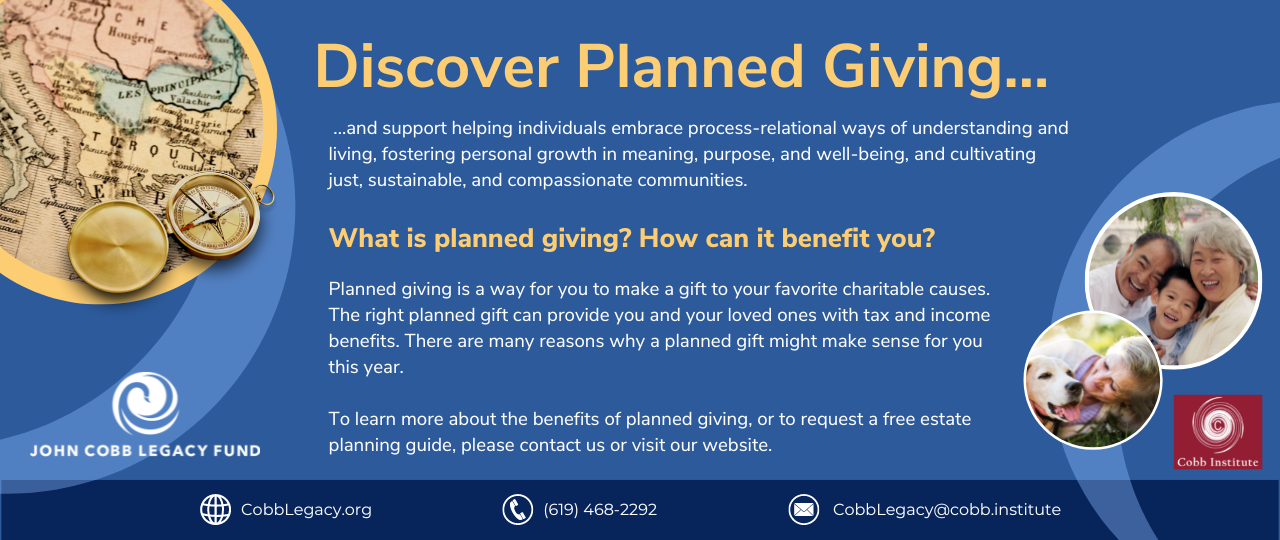Newsletter Spring 2023

TOGETHERNESS
Living Together - Learning Together - Growing Together - Flourishing Together
In this issue...

Photo courtesy Shane Rounce
“We cannot live only for ourselves. A thousand fibers connect us with our fellow men.”
—Herman Melville
Possibilities

Photo courtesy Papaioannou Kostas
The Cobb Institute, a community for process & practice. That’s who we are and if you are reading this, you're probably part of our community. But what do we mean and hope for when we talk about building community? First, we need to change the underlying philosophy in our culture. John Cobb has talked about the two big mistakes in our cultural worldview. One is individualism, or seeing ourselves as independent of others, and that my actions don't affect others. Another is dualism, or seeing human beings as different and separate from everything else. Humans have a desire to be together. Belonging is one of our greatest needs. We see the destruction that is often caused by those who feel alone and isolated from community.
Building community is one way to combat the individualism that John Cobb warns about. If within these communities we practice a process way of life and adopt the worldview that we are part of the world, we can begin to build a beloved community. Martin Luther King Jr. spoke of the Beloved Community: a community in which everyone is cared for, loved, and belongs, and poverty, hunger, and hate are absent.
King popularized the term during his lifetime of activism and imbued it with new meaning, fueled by his faith that such a community was, in fact, possible. But he always acknowledged that realizing his vision would involve systems of law, education, infrastructure, health care, and municipal reform — no one sector, much less one person, could create it in isolation.[source] This is John’s Cobb’s vision when he speaks of an ecological civilization.
Our modern culture is suffering an epidemic of alienation and isolation, yet we are overwhelmed with superficial invitations to participate in meaningless activities. Life pulls at us with mundane tasks and depletes our resources. At the Cobb Institute we want to genuinely embrace our relationality and create communities of justice, care, and compassion. This is a sacred space where friendships are formed and community is possible. This is a place of belonging. We cannot wait any longer. We must begin now.
“All I'm saying is simply this, that all life is interrelated, that somehow we're caught in an inescapable network of mutuality tied in a single garment of destiny. Whatever affects one directly affects all indirectly. For some strange reason, I can never be what I ought to be until you are what you ought to be. You can never be what you ought to be until I am what I ought to be. This is the interrelated structure of reality.”
—Dr. Martin Luther King Jr.
Growing Together
Those of us in positions of leadership at the Cobb Institute spend a lot of time thinking and talking about how to more effectively communicate who we are and what we do. We certainly don’t always succeed, but we try our best to find language that’s clear, concise, and inviting. Which can sometimes be very difficult, because we’re deeply influenced by the philosophy of Alfred North Whitehead. Part of our mission is to promote process ways of understanding and living, but we’re painfully aware that that term isn’t exactly a strong brand that’s recognizable, memorable, and durable in the way that, say, Apple, Nike, and Coca-Cola are.
One of our jobs is to try and change that. Our hope is that process will eventually resonate much more widely and evoke for others the kinds of ideas and sentiments that make it so meaningful for us. But when we brainstorm to try and come up with taglines and descriptions we consciously try to avoid the technical terms and insider jargon that we might love but has caused so much consternation for so many. Words like as prehension, ingression, superject, dipolar, and causal efficacy just don’t roll off the tongue; they tend to produce glazed eyes rather than clear images.
 Even so, I’ve often wished that some of those terms were more appealing to a wider audience, because they contain such a rich repository of meanings and layers and textures. For example, the notion of ‘concrescence’ simultaneously expresses something about the fundamental nature of reality, a basic mode of interaction between everyday objects, and a core characteristic of the Cobb Institute. The word comes from the Latin “con,” meaning “together,” and “crescere,” meaning “to grow.” So it literally refers to the process of growing together, which is an activity that takes place in an infinite variety of ways every level of existence, from the quantum to the cosmic.
Even so, I’ve often wished that some of those terms were more appealing to a wider audience, because they contain such a rich repository of meanings and layers and textures. For example, the notion of ‘concrescence’ simultaneously expresses something about the fundamental nature of reality, a basic mode of interaction between everyday objects, and a core characteristic of the Cobb Institute. The word comes from the Latin “con,” meaning “together,” and “crescere,” meaning “to grow.” So it literally refers to the process of growing together, which is an activity that takes place in an infinite variety of ways every level of existence, from the quantum to the cosmic.
Whitehead used the term to describe the synthesis of influences and elements and phases that constitute each occasion of experience in its process of becoming concrete or fully actual. A biologist might use the term to describe the process by which two or more parts of an organism converge into one another or fuse together. A geologist might use it to describe the process by which individual mineral crystals grow together to form larger, more complex structures. And I think concrescence concisely captures something significant about the core of Cobb Institute.
We don’t always state or emphasize it as we are here in this newsletter, but over the past several years the importance of the non-legal portion of our name—A Community for Process & Practice —has become increasingly clear to me. Virtually everything the Cobb Institute does involves creating, nurturing, or collaborating with communities. No single individual sees themself as standing in isolation from others but always in relation to others, because what I do makes a real difference to your life and what you do makes a real difference to mine. We thus understand ourselves as persons-in-community, growing together, learning together, and (at our best) thriving together. Of course, that means the converse is also true; that is, it involves failing together, because our lives are intertwined in such a way that what benefits one benefits others and what harms one harms others.
Even more than that, though, we are, as John Cobb likes to sometimes say, a community of communities; a collective made up of many collectives, such as board members, donors, friends, partners, volunteers, class members, learning circle participants, etc. Inspired by the vision of a concrescing cosmos in which everything is interconnected, interdependent, and interbecoming, and a shared desire to bring about creative transformations that nurture compassionate and just communities to help build an ecological civilization, the notion of community is woven into the fabric of our identity.
It is this fundamental framework that led us to initiate a new initiative: COHORTS. You can read more about the program below, but their primary purpose is to provide a supportive environment for those who want to live out process ways of becoming by participating in a shared form of behavior that fosters fulfillment and joy among its members and nurtures deep relationships between them. Our hope is that this communal endeavor to grow and learn and thrive together will significantly deepen our roots and strengthen our branches as we try to reach outward to make a genuinely positive difference in the world.
Richard Livingston
Executive Director
Emerging Communities: Cohorts

Many people think of belonging as a kind of mythical place or utopian ideal, and they spend a lifetime searching for it in vain. But what if belonging isn’t a place or a destination that one finally arrives at? What if it’s a mode of living and loving and sharing and caring that has been lost or forgotten? At the Cobb Institute we are being more intentional about creating communities within our community. We can overcome the emptiness of modern life to become true members of common people with a strong connection to the planet. We can share our stories with one another. We can learn from one another. We can bear witness to each other as a sacred practice. We can find belonging in community with one another.
As noted by Richard above, the inspiration behind the creation of the cohort program is comprehensive picture of the universe in which everything that exists is intertwined and interactive, and a desire to live out that perspective by planting mico-communities that will concretely manifest those macro-conceptions. Cohorts are thus typically small groups with a specific area of interest that involves engaging in some type of concrete activity. The central thread that binds each one together is a shared commitment to and participation in a particular type of “hands-on” exercise–e.g., gardening, painting, playing music, making photographs, writing poetry, etc. Cohorts thus provide a nurturing space for those who want to engage in a shared form of behavior that fosters fulfillment among its members and nurtures connections between them.
We're very proud to publicly announce our first two cohorts today: Eco-Gardening and Music for All Ages. They're both still in the formative stages, so please be patient with us as they take shape. In fact, we hope that some of you will be interested in participating and nurturing their growth. And if these two don't interest you, that's okay, please share with us your ideas about cohorts that you'd like to lead, assist with, or participate in.
Our Cohorts
The Eco-Gardening Cohort is a space of sharing and wonderment at the relationship between humans and earth. The aims of the cohort are to provide a springboard for imaginative reflection in a process-relational mode, a resource for engaging in creative localization, and a network for connecting like-minded growers. It is open to all who are interested in gardens, whether in the backyard or the community, as well as urban farms, whether small or big. Beginners and experts alike are welcome to participate. The only requirement is that each participant be willing to listen to and learn from one another, share their perspective, and contribute to building an ecological civilization in whatever ways their circumstance allows.
The Music for All Ages Cohort promotes the well-being of others through the performance of music, and consists of individuals and teams who volunteer their talents to help create just and compassionate communities. It is a network of amateur musicians who believe in the healing power of music. Some volunteer their time and skills to foster musical memories for senior citizens, while others among offer their musical talents to bring joy to the hearts of young children. Some are instrumentalists, some are singers, some both. Some are in their twenties, some in their seventies. All are passionate about music making with and for others to promote healthy modes of becoming.
We Need One Another
—George Odell
Living Together
What if local communities can become communities of compassion? Could a struggling community that has historically been a food desert learn to feed itself through urban agriculture? Could public banking help this community? These are questions John Cobb has asked concerning the city of Pomona. If the Cobb Institute could be effective in Pomona, could other communities duplicate Pomona’s successes? Neighboring Upland voted to adopt a charter of compassion in 2022. Claremont and La Verne are considering doing so. Compassion is spreading, and we at the Cobb Institute are happy to hear it. Here is a story about a road to compassion in Pomona. We hope you feel inspired to think about the possibilities in your own communities.
The Resurgence of a City
It has been said that the only true social reform is one rooted in compassion—engaged compassion. This seems to be happening in Pomona, California.
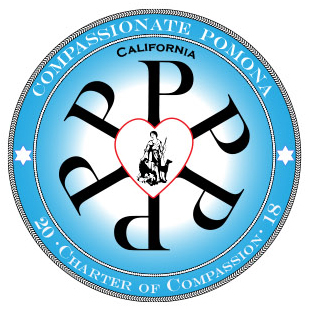 First, some background information about the city. Pomona held on to a reputation for wealth and success well into the last century. In middle of the twentieth century, vast acres of orange groves were replaced by very affordable tract houses. Not all buyers were ready for sustained home ownership, and many houses became vacant by the mid-1960s.
First, some background information about the city. Pomona held on to a reputation for wealth and success well into the last century. In middle of the twentieth century, vast acres of orange groves were replaced by very affordable tract houses. Not all buyers were ready for sustained home ownership, and many houses became vacant by the mid-1960s.
When the Watts revolt happened, quite a number of these homes were sold to people of color who yearned for the quiet and stability of a city like Pomona. There was no human relations program to smooth the way for major demographic change, and white flight ensued. By the late sixties and on through to the early nineties, gang structures formed and poverty gained a foothold.
By 2018, stability had largely returned, but scars remained. In this city of 150,000, about thirty miles east of Los Angeles, the poverty rate was double the national average, median family income was well below that of surrounding cities. Also, the downtown commercial center and the industrial base were a shadow of the more affluent years.
In 2018, the city council voted unanimously to make compassion a core value of the city. An interfaith group of Pomona Valley residents had worked hard to lay groundwork for this vote. Shortly after the council’s commitment, a conference was held in which residents gathered to explore the practical implications of compassion as a leading value.
A keynote speaker, in addition to Mayor Tim Sandoval, was Azim Khamisa. He told the story of his son Tariq’s death in San Diego at the hands of a gang member. Azim and his family were shattered that their fine son and brother was gunned down as he was earning college funds by delivering pizzas. Tariq Khamisa was killed because he resisted the theft of a pizza by the gang members who surrounded him. Azim is a Sufi Muslim, and in the course of his grief he consulted his faith. He decided that the only way through was to be compassionate toward the family of the shooter and even the shooter himself.
Over time, Azim was able to forgive the teenager who took his son’s life. This wasn’t easy, but it became liberating to a guilt-ridden teenager and to Azim as well. This story got to the heart of the meaning of compassion. It reached the hearts of the crowd gathered that day. It epitomized the journey the city is on—learning to live out the definition of compassion, which is to walk with those who suffer while finding ways to alleviate their suffering. The person who pulled that trigger is now working with the Tariq Khamisa foundation. His misery and guilt has been converted to the joy of being a spokesperson for nonviolence.
Prior to the city council vote and conference, the city had been showing compassion in a number of ways, such as shelter and services for unhoused residents, protection of refugees, assistance for ex-felons with the re-entry process, and a coalition of helping services called Pomona’s Promise.
Since 2018, engaged compassion has accelerated. Currently, the city is experimenting with universal income, exploring development of a public bank, organizing an urban farming project, pursuing restorative practices, enforcing a new rent control ordinance, and hosting an active environmental protection advocacy group called Pomona Clean and Green. Also, the expectation is that a wellbeing economy project will be implemented, whereby nonprofit businesses and worker owned enterprises will be established. The city council has voted unanimous support for this major effort to create an economy that works for all.
Some of the above is made possible by the efforts of Cobb Institute participants and by an organizational ally, the Institute for Ecological Civilization. The compassion theme goes hand in hand with a goal of both partners, which is to help build ecological communities.
Of course, no city can claim full arrival in becoming a compassionate community. It’s an ongoing journey, and Pomona is moving the needle in achieving engaged, rigorous, and creative compassion.
Richard Bunce
Board Member
“The opposite of love is not hate, it's indifference. The opposite of art is not ugliness, it's indifference. The opposite of faith is not heresy, it's indifference. And the opposite of life is not death, it's indifference.”
—Elie Wiesel
Learning Together
Upcoming Events
Saturday, March 4, 1:00 - 2:30 PM Pacific
In this presentation and conversation, Arran Gare and Matthew Segall will examine work in theoretical biology that might advance the way we understand mathematics and narratives, and their relation to each other and reality, and thereby how we should understand science and the humanities and their relationship to one another.
RSVP is required to receive Zoom info.
Saturdays, March 18 – April 22, 10 AM – 12 PM Pacific
This conversation series offers an analysis of learning events at each of the three stages of the rhythm of education, described in Whitehead’s classic The Aims of Education. Based on the recent book Starting with Whitehead by Lynn De Jonghe, it bridges the gap between the theory and practice of educational reform, and points the way for adults to help children thrive in a world of change.
RSVP is required to receive Zoom info.
Upcoming Courses
Discussion Communities
Do you want to join a discussion community? The Cobb Institute has two learning circles. Process and Coffee, a discussion group about books that foster an integral spirituality, is facilitated by Kathleen Reeves. An Awakening Planet, led by Ernie Tamminga, is a discussion group that explores the thought of Teilhard de Chardin and others. Facilitated by Terry Goddard, Readings on Faiths Around the World is a book group that reads and discusses books covering the vast diversity of world faiths.
Find out more about all our educational offerings here.
Creating Together
People might debate about what constitutes good art, but we are creative creatures in a creative cosmos. Art could be defined as a diverse range of human activity, and resulting product, that involves creative or imaginative talent expressive of technical proficiency, beauty, emotional power, or conceptual ideas. The Cobb institute celebrates creativity and lifts up artists in multiple ways. We have our Artist Laureates Christina Hutchins, Hope Montgomery, and Andre van Zijl.
We have our virtual art gallery, featuring five artists and their art. But we decided that we wanted to explore more art on a regular bases so we created the blog Novel Becomings.

Novel Becomings features the creative process of artists of all kinds, such as painters, poets, calligraphers, musicians, weavers, architects, and landscape artists. Each essay shares a story about the inspiration, the emergence, and the becoming of an artist's novel creation.
We have talked to multiple artists about their creative process and what inspires them. We hope you explore our virtual art gallery and art blogs and find creative or imaginative talent expressive of technical proficiency, beauty, and emotional power.
Are you an artist? We would love to hear from you.
Community in Spirit


Photo courtesy Tetiana Padurets
Process & Coffee began as the spiritual integration group that used to meet when the Cobb Institute was breaking into three groups during the Tuesday John Cobb and friends gatherings. The breakout meetings eventually ended so that we could give more time to the invited speaker for the main gathering. The spiritual integration group decided to continue to meet at a separate time in order to build friendships and to explore and deepen our spirituality. Our first meeting was in September of 2020. We began with Howard Thurman’s book, The Growing Edge. Since then then the group has discussed many books including Braiding Sweetgrass, Radical Wholeness, The Universal Christ, The Rhythm of Being, and currently, the Church of the Wild. Many of the original people are still in the group and new members have joined. The conversations are stimulating, and we learn not only from the books but from each other. This group is a place of intentional belonging.
Send an email to learninglab@cobb.institute if you'd like to join.
“Stay with friends who support you in these. Talk with them about sacred texts, and how you are doing, and how they are doing, and keep your practices together. There is nothing I want but your presence. In friendship, time dissolves. Be with those who help your being.”
—Rumi
Community of Friends
John Cobb & Friends Gatherings
| March 7 | Bethany Sollereder – Creating Your Own Theology in Light of Suffering |
| March 14 | Tim Burnette – Politics and Beauty: A Process Mysticism |
| March 21 | Ron Nahser – Medieval Monastic and University Spirituality: Management Practices for Ecological Civilization? |
| March 28 | Mark Anielsky – Economic Strategies We Can Learn from First Nations Peoples |

Community Across Borders

Recently, the Cobb Institute has teamed up with the Living Earth Movement and the Institute for Postmodern Development of China to create a series of conversations we've been calling "Living Earth Youth Dialogues." The idea is to bring together young people from China and the US to discuss the pressing ecological issues of our day, open-heartedly sharing local projects, concerns, and aspirations while forging real friendships and cross-cultural bonds along the way. John Cobb and other "elders" of our process communities will also share wisdom and their own perspectives, but the main idea is to let the young people of China and the US to lead the discussion.

The next conversation takes place on Friday, March 3rd, at 5:00 PM Pacific. This month's speaker is Jared Morningstar, who will explore resources and roadblocks to ecological thinking and living found within both Eastern and Western philosophical and religious systems. He will first discuss Christianity and Islam, detailing potential issues of transcendence and anthropocentrism in these traditions. He will also examine Buddhism and Taoism where one finds a less pronounced historical consciousness than the Abrahamic traditions. To conclude, he will suggest how these traditions can be brought together under a process perspective to go beyond their individual shortcomings.
Learn more and RSVP at the Living Earth Movement website.
“What should young people do with their lives today? Many things, obviously. But the most daring thing is to create stable communities in which the terrible disease of loneliness can be cured.”
—Kurt Vonnegut
The Process Community: An Actual (Anniversary) Occasion
The process movement is an evolving family of people around the world who are drawn to process-relational thinking and its way of life as one of the better hopes of the world. They come from many walks of life and cultural-religious traditions; their numbers include people from Venezuela, Nigeria, Germany, Sweden, China, Korea, Canada, and the US, to name a few. We are an international family. You may be part of it. At a recent gathering in Claremont, CA, some among the family met in a session to share reflections on the future of the process movement. The session was one among many events in the larger context of a week-long celebration of John Cobb’s 98th birthday; the fiftieth anniversary of the Center for Process Studies; a memorial for David Ray Griffin; and the Common Good Film festival. What is the future of the movement? How might it move forward? It’s up to everybody.
Jay McDaniel
Board Chair

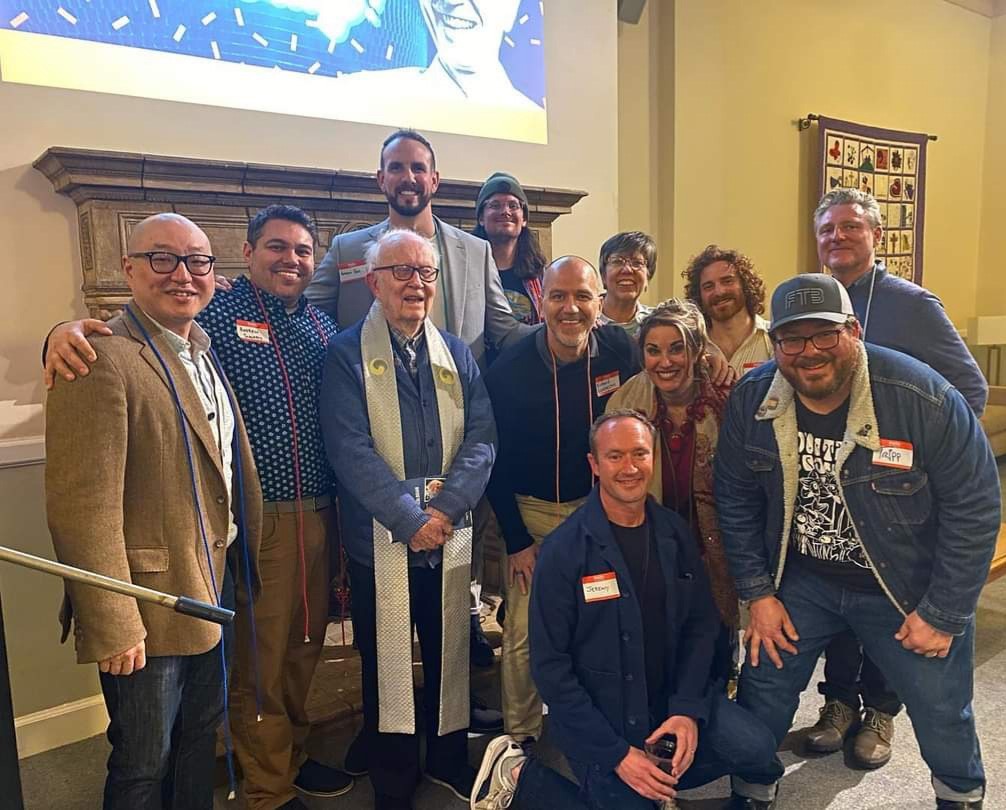



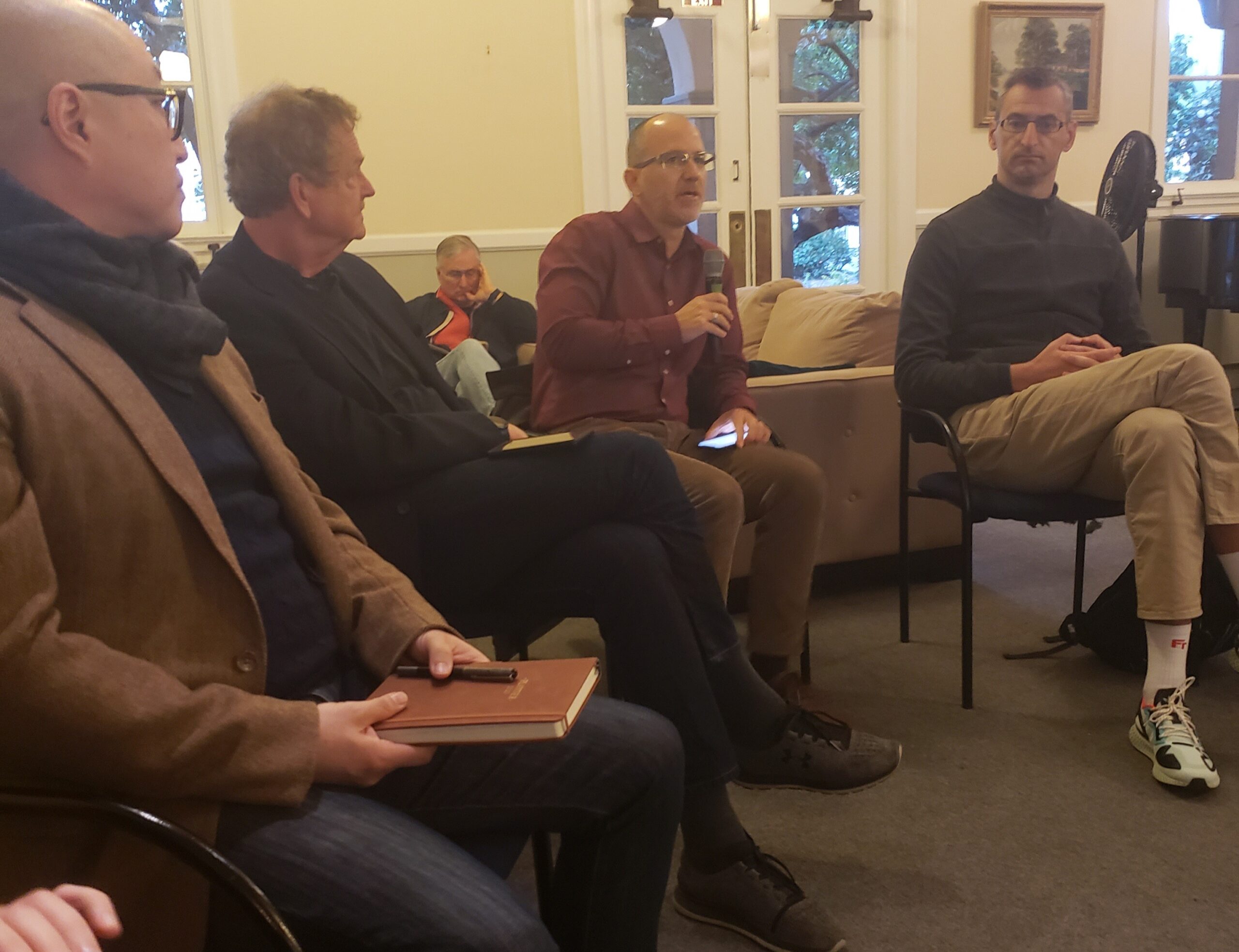

“It is an absolute human certainty that no one can know his own beauty or perceive a sense of his own worth until it has been reflected back to him in the mirror of another loving, caring human being.“
—John Joseph Powell



The week of February 13 through 19 the process community experienced "togetherness" as members of the process family came together from all over the world to celebrate the 50th anniversary of CPS and John Cobb’s 98th birthday. There was also a memorial service for David Ray Griffin, who passed away in November 2022 after a long illness. The process family is truly like a loving family, who celebrate each other and grieve together.
We are a family of diverse interests. One might ask how such a community of diverse interests can come together as what John Cobb calls "the process family." It is something like love. We see each other and the world through a process-relational lens. It is an awareness that we affect each other and we need each other. The world is in need, and many of us feel the lure to help.
There is something in the underlying philosophy and worldview that reminds us how we affect each other. There is less competition and more collaboration.
We have something special, but we can't keep it hidden. The world needs a new underlying philosophy. Many people feel that something is missing, and they are seeking for such a better understanding of their world. They want to leave behind the "me" in favor of the "we."
Did anyone else feel this too? Do we have to wait for once a year to be connected? Can we stretch out that “togetherness” into many small group zoom gatherings? We plan to try. Please stay turned and join in.
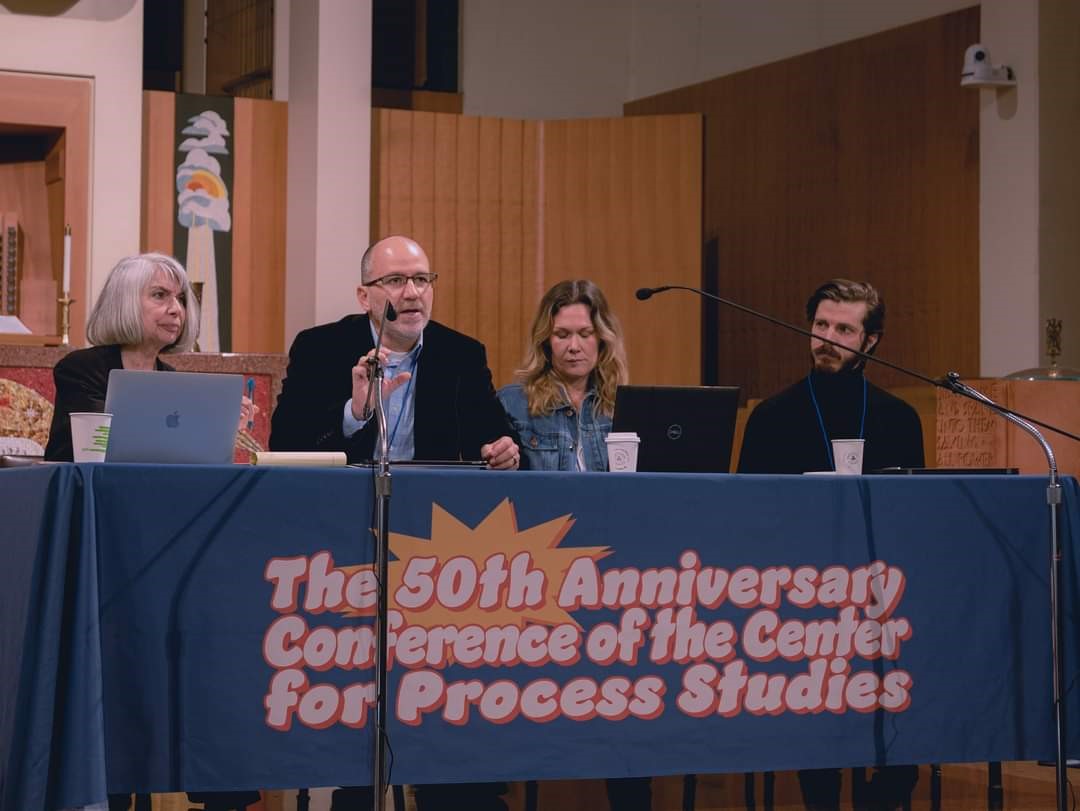

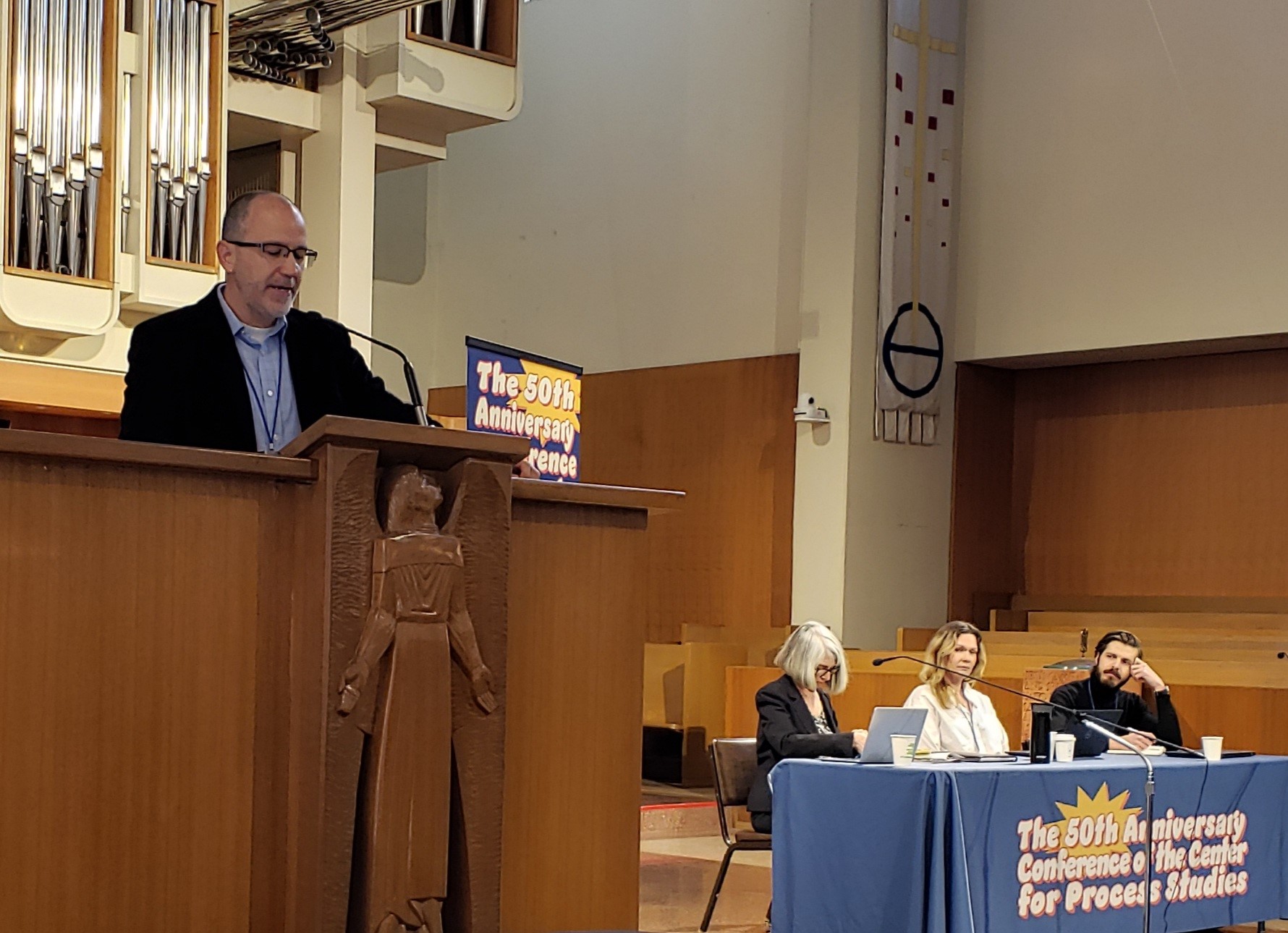



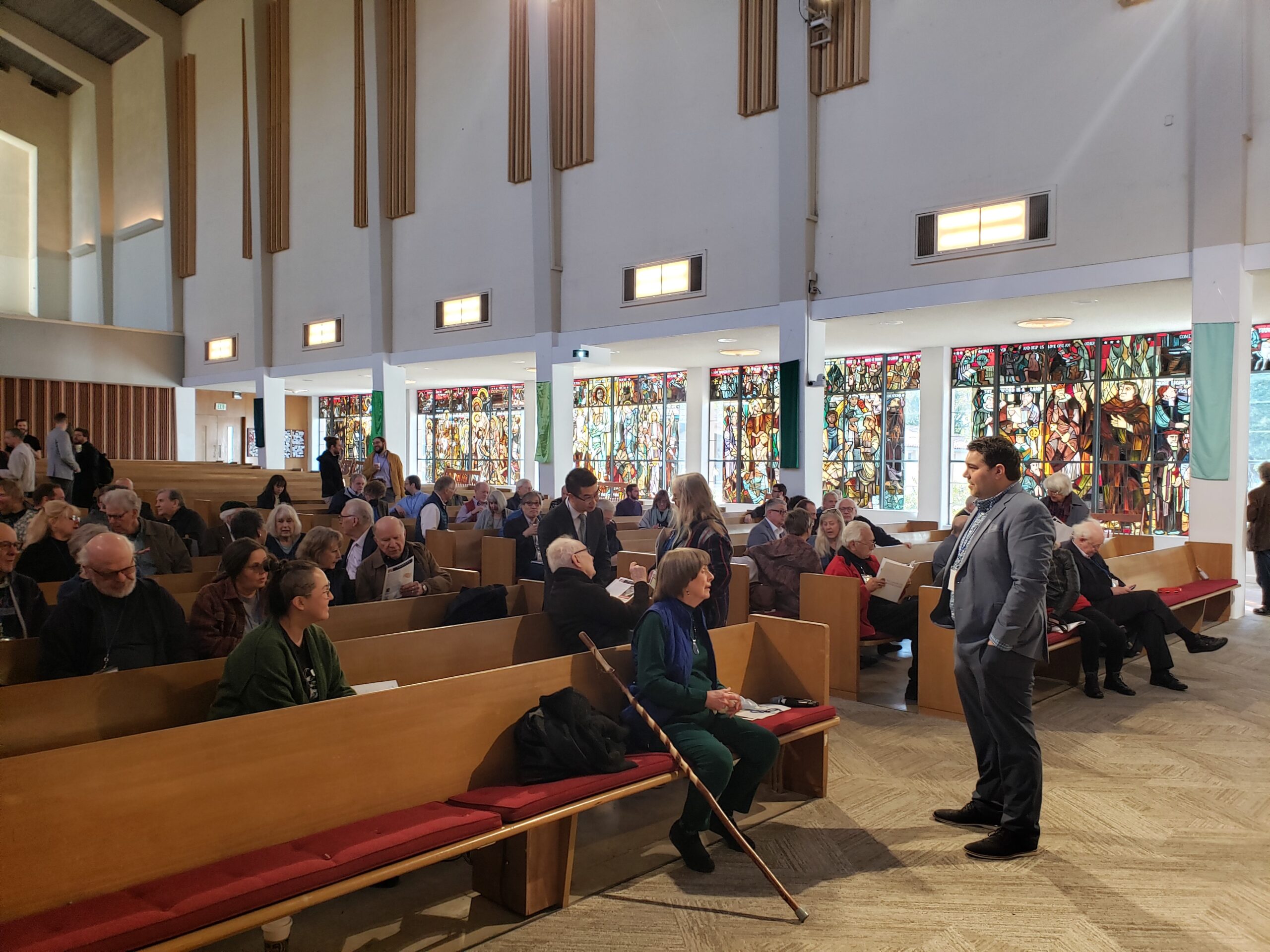



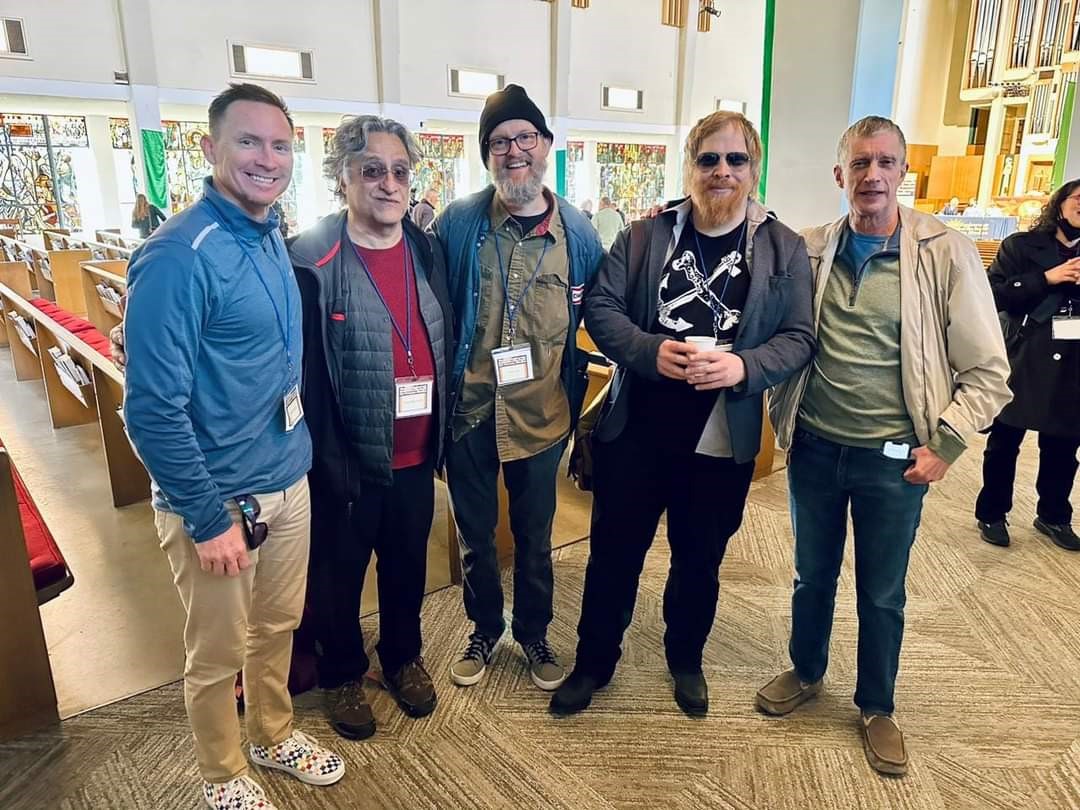
My senses have been overwhelmed. I felt more joy during the three conference days than I have in the last three years. I felt that I was in a place of belonging. I felt love and joy, and that I was embraced as a part of this process family.
But what is my role in this community of academics? I'm not an academic, nor do I plan to be. I apply process philosophy to my life. I live my life with an awareness that my every action adds something of value to the world. I try to add beauty, creativity, and love. I am a practitioner. I want to explore and experience and write my ideas. I'm not a researcher. I'm an experiencer. There is room for me here.
Today I was aware of my feelings of love for each person I spoke to. These feelings were deep and added beauty to our community. I was affected by each person that I talked to and that was very healing for me. Right now, I feel gratitude for that healing. It was needed more than I can say.
Kat Reeves
Community Relations Specialist
Communities of Communities of Communities

The heart of the Claremont Process Nexus is a network of organizations that share a common commitment to process-relational ways of understanding and living. The Nexus came into being through a collaboration of organizations that grew out of the work in Claremont, California: Center for Process Studies, Institute for Ecological Civilization, Pando Populus, and Cobb Institute. As the progenitor of the other three, a primary aim of the Center for Process Studies was to develop and promote interest in process thought, especially that of Alfred North Whitehead, among philosophers, theologians, scientists, educators, lawyers, and so forth. The Process Nexus builds on and expands that ambition by providing a way for members of the process movement to better communicate, collaborate, and support one another.
Joining the Nexus does not mean that you need to take on anything additional or that anyone will tell you what to do. It does not mean that you commit yourself of your organization to any set of beliefs or practices. It does mean that you are comfortable relating to other organizations with a similar heritage to yours, at least on some topics.
As a member you will learn about other opportunities, and be invited to attend events about which you would not otherwise know. We hope there will be occasions when you support others and others support you. Some of you as individuals may enjoy discussing specific questions or new books. Others may be interested in finding resources or connecting with like-minded individuals. Our aim is for this endeavor to benefit all who participate.
Flourishing Together
John B. Cobb, Jr., has devoted his life to promoting ways of understanding the world, and our place in it, that help people and planet flourish. At the recent 50th anniversary conference of the Center for Process Studies, a new book of John's writings was presented to him as a surprise for his 98th birthday. All proceeds go to the John Cobb Legacy fund. You can purchase the book here.
The John Cobb Legacy Fund is the Planned Giving Program created by the Center for Process Studies, the Cobb Institute, and the Institute for Ecological Civilization (EcoCiv) to further the work that Dr. Cobb began and inspired. EcoCiv serves as Trustee of the Fund on behalf of member charities. Click here to find out more about how you can contribute to the legacy.












